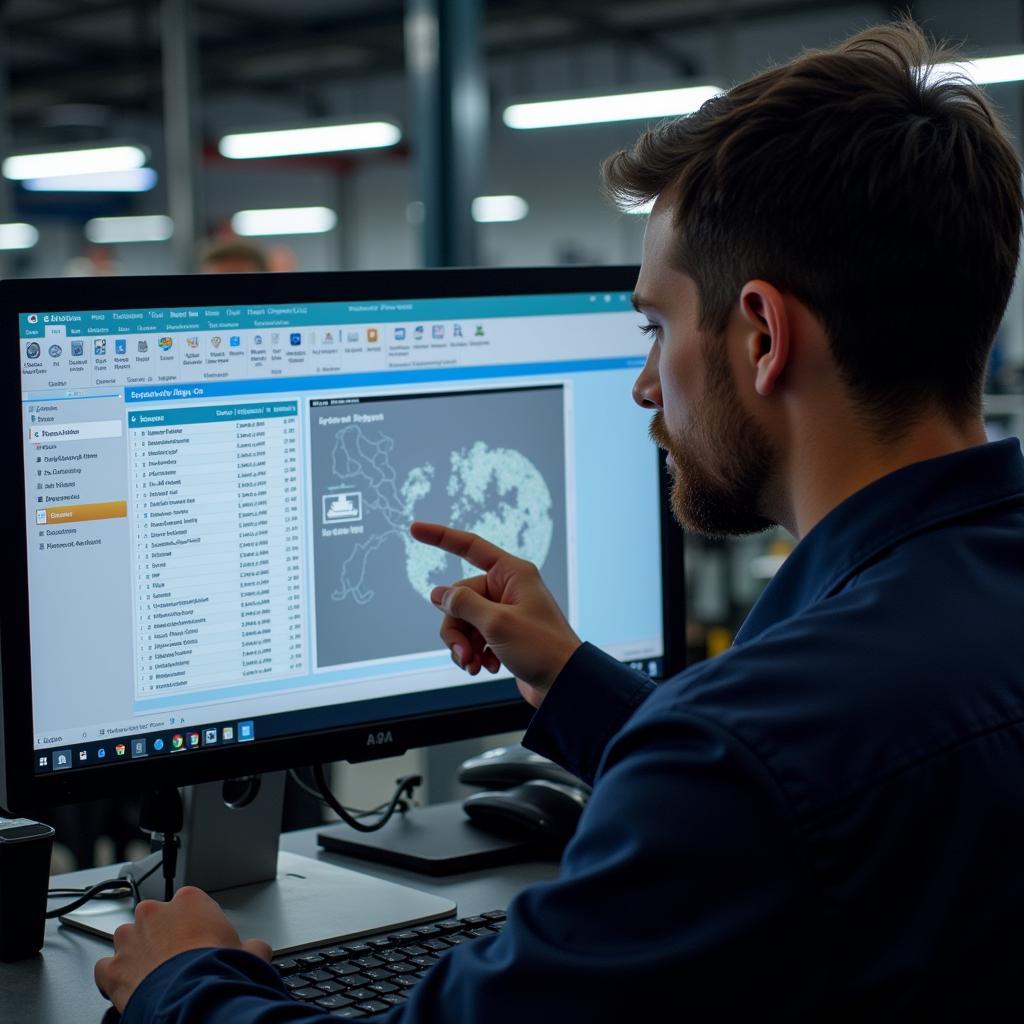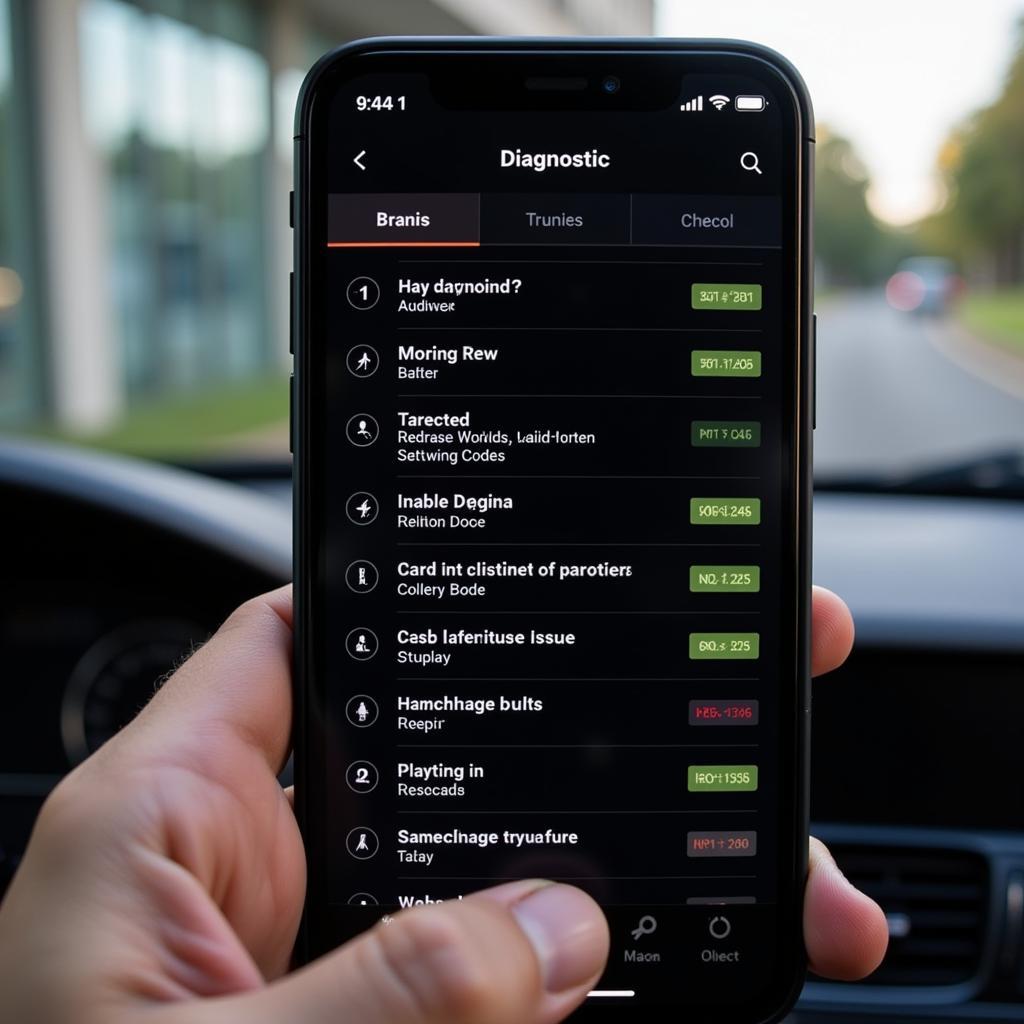A Car Full Diagnostic, also known as a comprehensive vehicle scan, goes beyond just reading your car’s check engine light. It’s an in-depth analysis of your vehicle’s electronic systems, providing a detailed report on its overall health and pinpointing potential issues before they become major problems.
Understanding the Importance of a Full Diagnostic Test on Car
Modern vehicles are complex machines with intricate networks of sensors and electronic control units (ECUs). These systems manage everything from engine performance and fuel efficiency to safety features like airbags and anti-lock brakes. When a problem arises, the car’s onboard computer stores a diagnostic trouble code (DTC) in its memory. A full diagnostic scan accesses these codes, providing crucial insights into the health of your car.
Benefits of Getting a Car Full Diagnostic
A full car diagnostic offers numerous advantages:
- Early Problem Detection: Identifying issues early can prevent costly repairs down the road.
- Improved Performance: Addressing underlying problems can restore your car’s optimal performance and fuel efficiency.
- Safer Driving Experience: Ensuring all safety systems are functioning correctly provides peace of mind on the road.
- Informed Purchase Decisions: A pre-purchase inspection using a full diagnostic scan is essential when buying a used car, giving you leverage in negotiations.
- Transparency and Trust: Understanding the true condition of your car through a detailed report empowers you to make informed decisions about maintenance and repairs.
What Does a Car Full Diagnostic Check Cover?
A comprehensive diagnostic test typically covers the following systems:
- Engine and Transmission: This includes checking for misfires, fuel system issues, transmission problems, and more.
- Emissions System: Analyzing the performance of components like the catalytic converter and oxygen sensors.
- Braking System: Assessing the health of the ABS system, brake pads, rotors, and other braking components.
- Airbag System: Ensuring all airbags and sensors are functioning properly.
- Steering and Suspension: Checking for issues with power steering, alignment, and suspension components.
- Other Electronic Modules: This can include analyzing the body control module, climate control system, and more.
How Often Should You Get a Car Full Diagnostic?
While opinions vary, most experts recommend a full car diagnostic at least once a year or every 12,000 miles. Additionally, consider getting a diagnostic check if:
- You’re experiencing unusual noises, smells, or performance issues.
- Your check engine light is on or flashing.
- You’re planning a long road trip.
- You’re considering buying a used car.
 Mechanic Analyzing Diagnostic Report
Mechanic Analyzing Diagnostic Report
Choosing the Right Diagnostic Tool and Service
You have two main options for getting a car full diagnostic:
-
Professional Mechanic: Taking your car to a trusted mechanic offers the most comprehensive analysis and expert interpretation of the results. Look for ASE-certified mechanics with experience in car diagnostics. You can find reliable mechanics near you by searching for a “full diagnostic test on car near me”.
-
DIY Diagnostic Tools: Several affordable OBD2 scanners are available for car owners who prefer a more hands-on approach. These tools can read and clear basic codes, but for in-depth analysis and troubleshooting, it’s best to consult a professional.
If you’re considering a DIY approach, you might be interested in exploring options like the “Carly car diagnostic tool”. These tools can be a valuable resource for understanding your car’s basic health but remember, they shouldn’t replace a professional inspection.
Beyond the Scan: Understanding Your Car Diagnostic Code List
After a full car diagnostic, you’ll likely receive a list of diagnostic trouble codes. These codes are standardized and can be deciphered to understand the specific issues detected. You can easily find a “car diagnostic code list” online or consult a professional mechanic to help you interpret the results.
 Car Diagnostic Code List
Car Diagnostic Code List
The Importance of Addressing Issues Promptly
Ignoring warning signs or postponing necessary repairs can lead to more severe and costly problems in the long run. By addressing issues early, you can:
- Extend the Life of Your Vehicle: Preventative maintenance keeps your car running smoothly and extends its lifespan.
- Save Money on Repairs: Addressing minor problems early can prevent them from escalating into major, expensive repairs.
- Ensure Your Safety: A well-maintained car is a safer car.
Car Warranty Ending? Consider a Full Diagnostic Check
If your car warranty is nearing its end, getting a full diagnostic check is crucial. It can help you identify any underlying issues that might be covered under warranty before it expires. For more information, read our article on “car warranty ending should I get a full diagnostic check”.
In Conclusion: Prioritize Your Car’s Health with Regular Diagnostics
A car full diagnostic is an essential aspect of vehicle ownership. It provides valuable insights into your car’s health, enabling you to address issues proactively and avoid costly surprises. By understanding the importance of regular diagnostics and addressing problems promptly, you can ensure your car’s optimal performance, longevity, and safety on the road.
FAQs about Car Full Diagnostics
1. How long does a full car diagnostic take?
A full car diagnostic typically takes between 30 minutes to an hour, depending on the complexity of the vehicle’s systems and the number of codes stored.
2. How much does a car full diagnostic cost?
The cost of a full car diagnostic can vary depending on the mechanic’s labor rates and your location. On average, expect to pay between $80 to $150 for a professional scan.
3. Can a full car diagnostic drain my car battery?
No, a full car diagnostic should not drain your car battery. The diagnostic tool draws very little power from the vehicle’s electrical system.
4. Will a full car diagnostic reset my check engine light?
Yes, a full car diagnostic can reset your check engine light after the underlying issue has been identified and addressed.
5. Do I need to take my car to a dealership for a full car diagnostic?
No, you don’t necessarily need to take your car to a dealership for a full car diagnostic. Many independent mechanics are equipped with advanced diagnostic tools and expertise.
6. Can a full car diagnostic detect problems with my car’s tires?
While a full car diagnostic can’t directly assess the condition of your tires, it can identify issues with the tire pressure monitoring system (TPMS), which can indirectly indicate tire problems.
7. Can I drive my car with a check engine light on?
It’s generally not advisable to ignore a check engine light. While some issues might be minor, others can indicate serious problems that could potentially damage your car or compromise safety.
Still have questions or need help finding the right diagnostic tool or service?
Contact us via WhatsApp: +1(641)206-8880 or Email: [email protected]. Our team of car diagnostic experts is available 24/7 to assist you.
You might also find these articles helpful:
Let us help you keep your car running smoothly and safely.

Leave a Reply